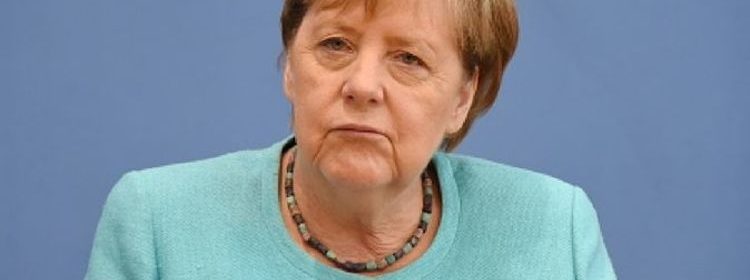Angela Merkel’s 5 biggest mistakes exposed as German leader leaves country in tatters

Merkel departure would have ‘major impact’ on EU says Butikofer
We use your sign-up to provide content in ways you’ve consented to and to improve our understanding of you. This may include adverts from us and 3rd parties based on our understanding. You can unsubscribe at any time. More info
The German Chancellor will retire from German politics in September when the country will head to the polls to elect its new leader. But according to Wolfgang Munchau, Angela Merkel’s long-praised political performance will reveal itself as a failure after she leaves.
Listing five major failures of the German leader, the Director of Eurointelligence said: “The trend towards mediocrity is the bane of modern governments in general.
“When people stop marvelling at Angela Merkel’s political longevity, they will find a country that has no functioning systems in place to evacuate people.
“Or a system that can’t manage a nationwide vaccine rollout.
“Or a system that doesn’t know how to pick winners. The German government invested €300m in Curevac, the German vaccine that didn’t make it.

“The Wirecard episode is ultimately a systems failure – one based on a wrong understanding of good vs bad innovation.
“German energy policy has been a random walk – that ended up with a dependency on Russian gas.”
Ms Merkel’s successor, Armin Laschet, is already facing a tough race ahead of him after he was forced to apologise for laughing on a visit to a flood-stricken town last week.
The gaffe hit his ratings two months before a federal election.
Mr Laschet’s conservative bloc is around 10 points ahead of the Greens in most polls, but his lapse last weekend at Erftstadt, when he was caught on camera laughing at a joke while the country’s president was giving a sombre speech, has cost him.
“It was stupid and shouldn’t have happened and I regret it,” he told ZDF television. “I am sorry, I can’t say much more.”
The incident spawned a Twitter storm under the hashtag “laschetlacht” (Laschet laughs).
An INSA poll on Sunday showed that 57 percent of Germans viewed Mr Laschet’s actions in the catastrophic floods, which killed at least 180 people, as negative.
In a direct vote for chancellor, Mr Laschet would only get 15 percent, down five points from last week, compared with 21 percent for his Social Democrat rival, Olaf Scholz, the poll showed.
DON’T MISS:
Boris Johnson crisis: Poll lead collapsing as Tory MPs set to revolt [INSIGHT]
Brexit live: Boris throws away new EU proposals – orders WA reopened [LIVE BLOG]
EU’s ‘cod war’ with Norway ramps up as Brussels threatens Oslo [ANALYSIS]

In a wide-ranging interview with ZDF television, Mr Laschet said he was determined to shift the campaign for the September 26 election on to issues such as the economy and climate change.
“It is understandable that polls will fluctuate in a difficult week but in the next few weeks I want to shape the discussion on issues,” he told ZDF.
Playing down differences with his Bavarian conservative rival, Markus Soeder, who has pushed for more ambitious climate targets, Mr Laschet said he believed Germany would have phased out its coal before the target date of 2038.
“We should stick to the plan. But I think we will exit it more quickly than we all think due to CO2 prices,” he said.
He also said he was not at odds on tax with Mr Soeder, whose CSU forms a parliamentary bloc with Mr Laschet’s bigger CDU.
Popular Mr Soeder lost a bid to become the conservative chancellor candidate thanks to vested CDU interests in Laschet.
“In tax we are very close,” said Mr Laschet, when asked about Mr Soeder’s calls for tax reductions.
Making clear that his priority was not cutting taxes, Mr Laschet said the conservatives wanted stable state finances and that to promise blanket cuts was “not serious”.
Saying major investment was needed for Europe’s biggest economy to recover from the COVID-19 crisis, he pointed out that Germany was bound by strict rules limiting new debt which are enshrined in the constitution.
“If there is the financial scope, we will support reducing the burden on low- and medium-earners and that should happen for families by 2023,” said Mr Laschet.
Source: Read Full Article
